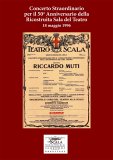![Mirella Freni and Cesare Siepi: In Concert [1985]](/pictures/1089325.jpg) Mirella Freni and Cesare Siepi: In Concert | DVD | (04/11/2008)
from £17.35
| Saving you £1.64 (9.45%)
| RRP
Mirella Freni and Cesare Siepi: In Concert | DVD | (04/11/2008)
from £17.35
| Saving you £1.64 (9.45%)
| RRP ![La Boheme / Madama Butterfly [1988]](/pictures/1028404.jpg) La Boheme / Madama Butterfly | DVD | (03/02/2003)
from £N/A
| Saving you £N/A (N/A%)
| RRP
La Boheme / Madama Butterfly | DVD | (03/02/2003)
from £N/A
| Saving you £N/A (N/A%)
| RRP La Boheme: This San Francisco production of La Boheme has real theatrical presence here, even to the extent that, at times, the vocal and orchestral subtleties get lost in wild applause. Pavarotti's Rodolfo was, in 1988, as plangently lyrical as ever and Freni's careworn Mimi is a deeply touching and musical performance; Pacetti is a beefy full-blooded no-nonsense Musetta--the waltz song and ensuing duet with Marcello is for once the Broadway show-stopper it ought to be. Of the supporting roles, though, perhaps the most moving is Ghiaurov's Colline--his farewell to his old coat is a short passage of deep pathos which he has rarely sung as well as he does here. Madama Butterfly: With its Japanese director and designer, this 1986 production of Madama Butterfly strives for authenticity in the setting, yet is somehow entirely Italian at the same time. Yasuko Hayashi's Cio-Cio-San is surprisingly tough, rejecting the arguments of her uncle and the marriage broker with more anger than usual, and her suicide is as much a moral statement of integrity as a sentimental gesture. Accordingly, Dvorsky's sexually magnetic Pinkerton is even less sympathetic--you can see what she sees in him, but he is arrogant and a user, except when he is being lyrical--and Zancanaro's Sharpless, the consul who expedites Pinkerton's betrayal of his wife but develops his own compassion for her, is all the more complex and interesting. The production has real charm as well as authenticity on its side; the staging of the love duet is impressive in its use of shadow and delicate light. Maazel's interpretation has a forceful energy that the recording impressively conveys. --Roz Kaveney
 Teatro Alla Scala: Riccardo Muti's 50th Anniversary Concert | DVD | (06/02/2006)
from £N/A
| Saving you £N/A (N/A%)
| RRP
Teatro Alla Scala: Riccardo Muti's 50th Anniversary Concert | DVD | (06/02/2006)
from £N/A
| Saving you £N/A (N/A%)
| RRP Gioachino Rossini1. Ouverture2. Coro e danze dell'Imeneo da: Mose in Egitto3. Preghiera: Dal tuo stellato soglio Mirella Freni - Luciana D'Intino - Vincenzo La Scola - Samuel Ramey.Giuseppe Verdi4. Sinfonia5. Va' pensiero da: I vespri siciliani6. Sinfonia7. Te DeumElizabeth Norberg-SchulzGiuseppe Verdi8. Finale II (La vergine degli angeli)Mirella Freni - Samuel RameyGiacomo Puccini9. Intermezzo10. In quelle trine morbideMirella FreniArrigo Boito11. PrologoSamuel RameyGiuseppe Verdi12. Va' pensiero
 Puccini: Madama Butterfly -- 1974 film version/Von Karajan | DVD | (15/10/2001)
from £N/A
| Saving you £N/A (N/A%)
| RRP
Puccini: Madama Butterfly -- 1974 film version/Von Karajan | DVD | (15/10/2001)
from £N/A
| Saving you £N/A (N/A%)
| RRP Of all Puccinis major operas, the intimate tragedy of Madama Butterfly is least in need of elaborate staging and might therefore benefit most from the close scrutiny of film. The story is domestic, the setting Spartan, the incidental characters kept to a minimum. This 1974 version, however, demonstrates that Butterfly still needs a healthy injection of proscenium arch melodrama. Director Jean-Pierre Ponelles production strives for realism but remains unfortunately studio-bound, having neither the benefit of location filming nor the heightened reality of an opera stage. The exterior is a perpetually fog-shrouded heath of indeterminate locale; the interior is cramped and unadorned. The setting is just too prosaic to contain the epic emotions of grand opera. Thankfully, the cast is superb, headed by Placido Domingos rakish Pinkerton and Mirella Frenis rubicund Butterfly. Their singing is incomparable, as is Herbert von Karajans musical direction of the Vienna Phil. The singers mime to pre-recorded music, which is occasionally disconcerting since when film demands close-ups opera provides broad gestures. Musically, this Butterfly is impeccable. Visually it adds nothing that could not be seen to better effect in a stage version. On the DVD: Madama Butterfly is presented disappointingly on disc in a poor NTSC transfer full of distracting graininess that makes every scene, both inside and out, look like it takes place in an omnipresent drizzle. Sound is reasonable stereo and adequate 5.0 surround. There are subtitles in the major European languages as well as Chinese, and the booklet contains a background essay plus synopsis. --Mark Walker

Please wait. Loading...
This site uses cookies.
More details in our privacy policy